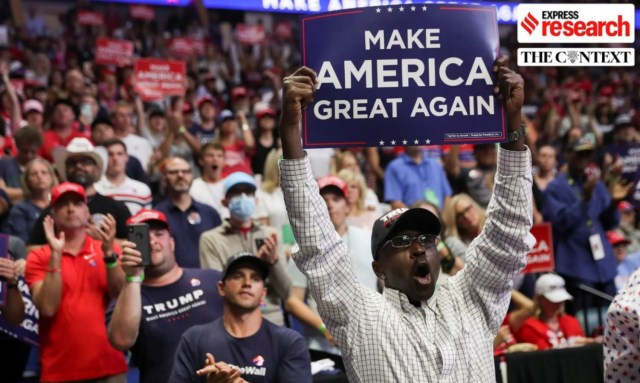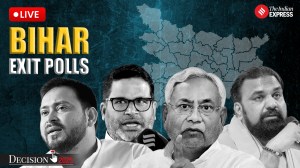Why Black and Latino voters support Trump despite historical loyalty to Democrats
The balance of power in key battleground states could hinge on how effectively candidates engage with the diverse perspectives within Black and Latino populations.
 Black and Latino voters have increasingly shifted to the right
Black and Latino voters have increasingly shifted to the right In 2016, Trump’s controversial remarks about Mexican immigrants and his unfounded claims regarding Barack Obama’s birthplace painted a contentious picture of his candidacy. Yet, as polling data from New York Times/Siena College suggests, Trump may now be garnering unprecedented support among Black and Latino voters—outperforming all Republican nominees since 1964.
It is important to note that while Trump has gained some ground with Black and Hispanic voters compared to past Republican candidates, he still lacks a majority support from these groups. However, given the substantial margins by which Democrats have traditionally won these demographics, even modest support can yield significant political gains.
For example, in Arizona, nearly 25 per cent of voters in the upcoming election are expected to be Latino, with almost 20 per cent in neighbouring Nevada. In Georgia, Black voters make up about 30 per cent of the electorate. As these are all key swing states, micro-deviations in voting patters could have a significant impact on the election result. In order to offset these gains, a potential Democratic victory would rely on strong support and turnout from college-educated white voters and suburban residents, including those who leaned Republican before the Trump era.
Historical context of Black and Latino voting
Historically, the Black and Latino vote has undergone significant transformations, particularly through the 20th century. In the early 1900s, both groups exhibited a relatively equal distribution of support between the Republican and Democratic parties. However, the election of Franklin D Roosevelt in 1932 marked a pivotal shift; he had a majority of the Black and Latino vote by 1936, largely due to his New Deal policies that addressed the economic hardships of the Great Depression. Subsequent Democratic presidents, including Harry S Truman and Lyndon B Johnson, further solidified this trend by championing civil rights legislation, thereby attracting more Black and Latino voters.
Despite these historical ties, many contemporary Black and Latino voters do not share the same deep connection to the Civil Rights Movement. A significant portion of the Latino population in the US arrived after the 1960s, rendering them less influenced by the legacy of civil rights leaders. This demographic shift complicates the narrative of unwavering loyalty to the Democratic Party among voters of colour.
Conservative social values
One of the most significant factors influencing the shift in support for Trump among Black and Latino voters is the appeal of conservative social values. Many Latino immigrants, particularly those from South America and Cuba, tend to have strong religious convictions and conservative views on social issues. Polls indicate that self-identified Hispanic Catholics are increasingly favouring Trump, with a Washington Post/ABC News survey noting a rise from 32 per cent in 2020 to 47 per cent intending to vote for him in the upcoming election.
Similarly, older Black voters tend to lean conservative on social issues as well, particularly those who identify as regular churchgoers.
Alfonso Aguilar, director of Hispanic engagement at the American Principles Project, argues to The Register that Democrats have failed to recognise the ideological diversity within the Hispanic community. As a result, many conservative-leaning voters feel alienated by the Democratic platform, particularly on issues such as abortion and gender identity.
Immigration
Immigration remains a contentious issue that has shaped voting behaviours among Latino voters. Polls indicate that a significant percentage of Latinos favour stricter immigration policies— 62 per cent support more stringent measures, compared to just 23 per cent who prefer leniency. This perspective is often rooted in a sense of competition for economic opportunities, where legal immigrants may resent those who have entered the country without documentation.
Recent surveys reveal a growing alignment with the Grand Old Party’s calls for enhanced border control. An Axios/Ipsos poll found that 42 per cent of Hispanic adults now support building a wall along the southern border, a notable increase from previous years. This shift reflects a broader sentiment where many Latinos view themselves as integrated Americans rather than as part of the immigrant group that Trump often critiques.
Economic concerns
Economic issues, particularly inflation and the cost of living, are paramount for many Black and Latino voters. As the economy continues to struggle, dissatisfaction with the current state of affairs has left these voters vulnerable to alternative narratives. A June 2024 Pew Research Poll found that 52 per cent of Latino voters express confidence that Trump would make sound economic decisions, indicating a growing belief that he could better address their financial concerns.
Most Black and Latino voters fit the political pollsters’ definition of working class due to their lack of a college degree. These voters tend to prioritise economic issues and their financial well-being, which makes Democrats susceptible after years of inflation. Trump’s appeal on this front is evident: while a majority of Black and Latino voters support Harris, significant portions of both groups believe that Trump would personally benefit them.
Trump’s appeal
Trump’s campaign has strategically targeted Black and Latino communities, utilising cultural touchpoints to enhance his appeal. His engagement with hip-hop artists and influencers—such as Snoop Dogg and Kanye West—illustrates a calculated effort to connect with younger voters of colour. Trump has cultivated an image of machismo and defiance, using his felony convictions to portray himself as an outsider. Following his booking at an Atlanta jail last year, his campaign shared a video of his motorcade on social media with the caption “gang gang bitches”.
At a recent gala hosted by the Black Conservative Federation in Columbia, South Carolina, Trump said he believed that his criminal cases had garnered him increased support among Black voters. He suggested that many see his indictments as a reflection of the historical injustices faced by their community. “A lot of people said that’s why Black people like me, because they have been hurt so badly and discriminated against,” he stated, asserting that they view his situation as one of discrimination as well.
As the 2024 election approaches, the ability of both parties to address the unique concerns of these communities will be critical. The balance of power in key battleground states could hinge on how effectively candidates engage with the diverse perspectives within Black and Latino populations, ultimately shaping the future of American politics.



- 01
- 02
- 03
- 04
- 05




























